Woojae Jeong
Informed Bootstrap Augmentation Improves EEG Decoding
Nov 15, 2025Abstract:Electroencephalography (EEG) offers detailed access to neural dynamics but remains constrained by noise and trial-by-trial variability, limiting decoding performance in data-restricted or complex paradigms. Data augmentation is often employed to enhance feature representations, yet conventional uniform averaging overlooks differences in trial informativeness and can degrade representational quality. We introduce a weighted bootstrapping approach that prioritizes more reliable trials to generate higher-quality augmented samples. In a Sentence Evaluation paradigm, weights were computed from relative ERP differences and applied during probabilistic sampling and averaging. Across conditions, weighted bootstrapping improved decoding accuracy relative to unweighted (from 68.35% to 71.25% at best), demonstrating that emphasizing reliable trials strengthens representational quality. The results demonstrate that reliability-based augmentation yields more robust and discriminative EEG representations. The code is publicly available at https://github.com/lyricists/NeuroBootstrap.
Decoding Neural Signatures of Semantic Evaluations in Depression and Suicidality
Jul 30, 2025
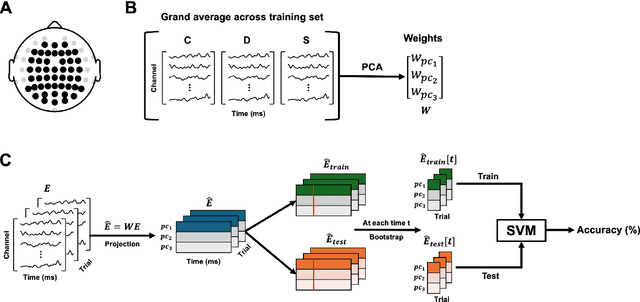
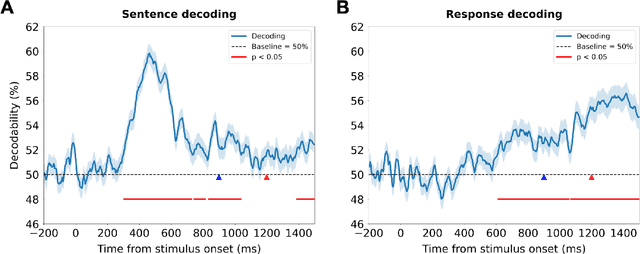
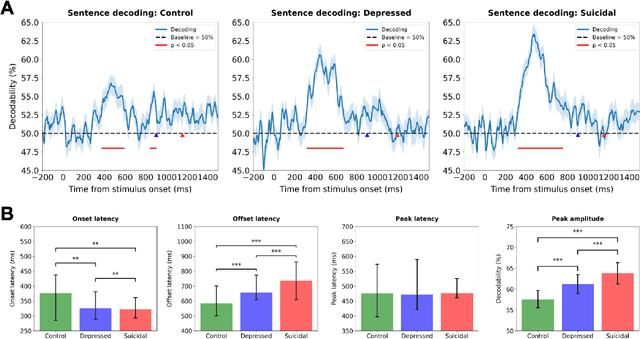
Abstract:Depression and suicidality profoundly impact cognition and emotion, yet objective neurophysiological biomarkers remain elusive. We investigated the spatiotemporal neural dynamics underlying affective semantic processing in individuals with varying levels of clinical severity of depression and suicidality using multivariate decoding of electroencephalography (EEG) data. Participants (N=137) completed a sentence evaluation task involving emotionally charged self-referential statements while EEG was recorded. We identified robust, neural signatures of semantic processing, with peak decoding accuracy between 300-600 ms -- a window associated with automatic semantic evaluation and conflict monitoring. Compared to healthy controls, individuals with depression and suicidality showed earlier onset, longer duration, and greater amplitude decoding responses, along with broader cross-temporal generalization and increased activation of frontocentral and parietotemporal components. These findings suggest altered sensitivity and impaired disengagement from emotionally salient content in the clinical groups, advancing our understanding of the neurocognitive basis of mental health and providing a principled basis for developing reliable EEG-based biomarkers of depression and suicidality.
Neural Responses to Affective Sentences Reveal Signatures of Depression
Jun 06, 2025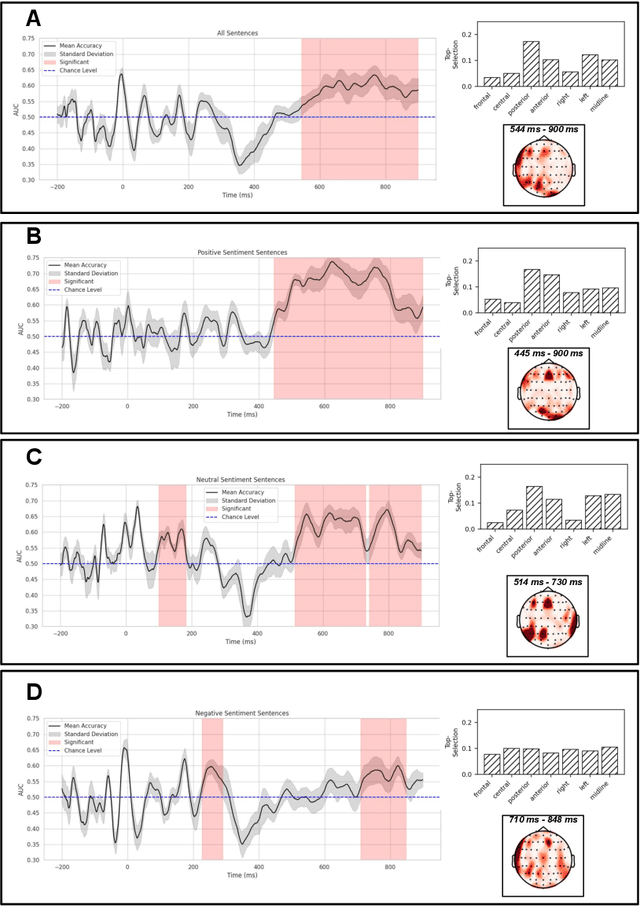
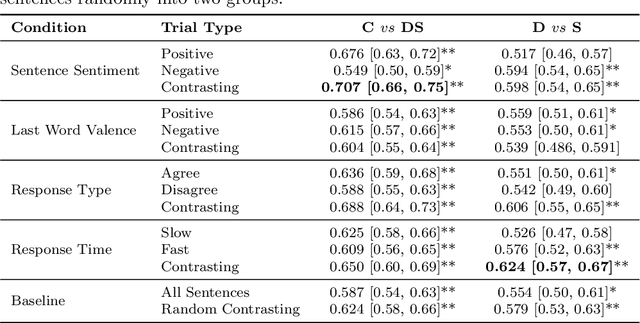
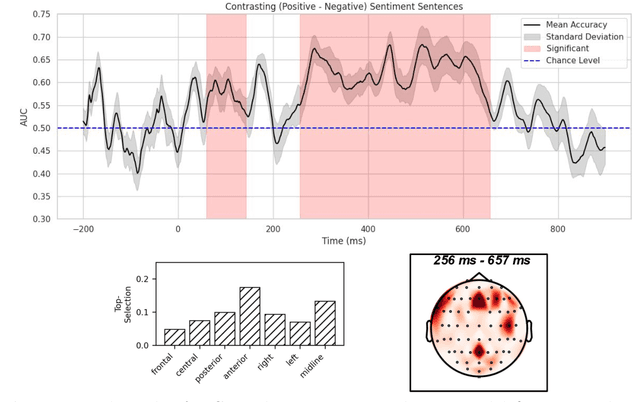

Abstract:Major Depressive Disorder (MDD) is a highly prevalent mental health condition, and a deeper understanding of its neurocognitive foundations is essential for identifying how core functions such as emotional and self-referential processing are affected. We investigate how depression alters the temporal dynamics of emotional processing by measuring neural responses to self-referential affective sentences using surface electroencephalography (EEG) in healthy and depressed individuals. Our results reveal significant group-level differences in neural activity during sentence viewing, suggesting disrupted integration of emotional and self-referential information in depression. Deep learning model trained on these responses achieves an area under the receiver operating curve (AUC) of 0.707 in distinguishing healthy from depressed participants, and 0.624 in differentiating depressed subgroups with and without suicidal ideation. Spatial ablations highlight anterior electrodes associated with semantic and affective processing as key contributors. These findings suggest stable, stimulus-driven neural signatures of depression that may inform future diagnostic tools.
Deep Learning Characterizes Depression and Suicidal Ideation from Eye Movements
Apr 29, 2025Abstract:Identifying physiological and behavioral markers for mental health conditions is a longstanding challenge in psychiatry. Depression and suicidal ideation, in particular, lack objective biomarkers, with screening and diagnosis primarily relying on self-reports and clinical interviews. Here, we investigate eye tracking as a potential marker modality for screening purposes. Eye movements are directly modulated by neuronal networks and have been associated with attentional and mood-related patterns; however, their predictive value for depression and suicidality remains unclear. We recorded eye-tracking sequences from 126 young adults as they read and responded to affective sentences, and subsequently developed a deep learning framework to predict their clinical status. The proposed model included separate branches for trials of positive and negative sentiment, and used 2D time-series representations to account for both intra-trial and inter-trial variations. We were able to identify depression and suicidal ideation with an area under the receiver operating curve (AUC) of 0.793 (95% CI: 0.765-0.819) against healthy controls, and suicidality specifically with 0.826 AUC (95% CI: 0.797-0.852). The model also exhibited moderate, yet significant, accuracy in differentiating depressed from suicidal participants, with 0.609 AUC (95% CI 0.571-0.646). Discriminative patterns emerge more strongly when assessing the data relative to response generation than relative to the onset time of the final word of the sentences. The most pronounced effects were observed for negative-sentiment sentences, that are congruent to depressed and suicidal participants. Our findings highlight eye tracking as an objective tool for mental health assessment and underscore the modulatory impact of emotional stimuli on cognitive processes affecting oculomotor control.
Neuro-GPT: Developing A Foundation Model for EEG
Nov 11, 2023Abstract:To handle the scarcity and heterogeneity of electroencephalography (EEG) data for Brain-Computer Interface (BCI) tasks, and to harness the power of large publicly available data sets, we propose Neuro-GPT, a foundation model consisting of an EEG encoder and a GPT model. The foundation model is pre-trained on a large-scale data set using a self-supervised task that learns how to reconstruct masked EEG segments. We then fine-tune the model on a Motor Imagery Classification task to validate its performance in a low-data regime (9 subjects). Our experiments demonstrate that applying a foundation model can significantly improve classification performance compared to a model trained from scratch, which provides evidence for the generalizability of the foundation model and its ability to address challenges of data scarcity and heterogeneity in EEG.
 Add to Chrome
Add to Chrome Add to Firefox
Add to Firefox Add to Edge
Add to Edge